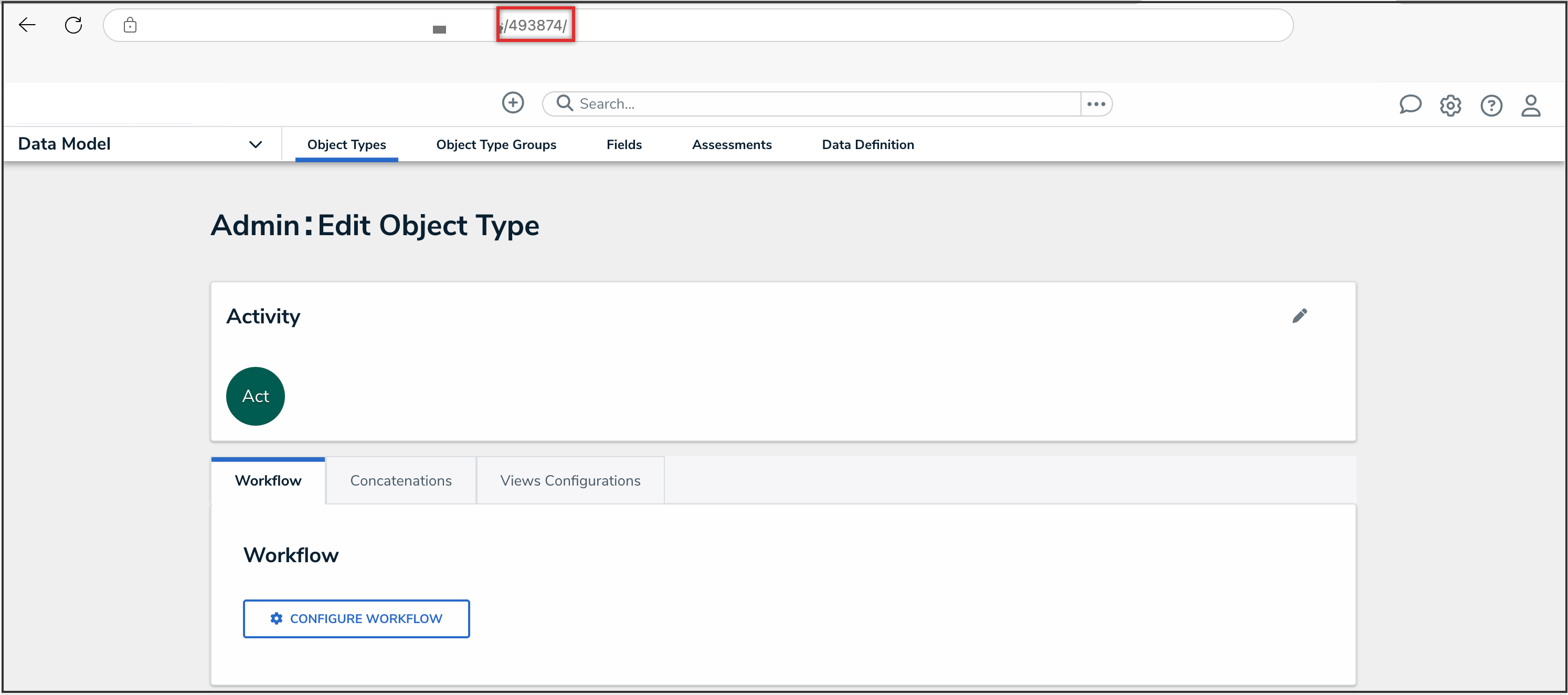Overview
Most elements in Resolver, such as objects, fields, reports, relationships, and configuration elements, are assigned an internal ID and an external reference ID, which represents these elements in the API when making calls. Some elements, like fields and object types, are also assigned a unique ID, which helps end-users identify them in Resolver.
 Note:
Note:
A record of created and deleted objects can be found in the Data Audit Trail.
Because external reference IDs don't change when moving them from one Org to another, it's recommended that external reference IDs are used when testing and working with an integration, using the following approach:
- Write the integration using the retrieved external reference IDs
- Retrieve the object type data and store it
- If object types' internal IDs are necessary for a particular endpoint, cross-reference them using the external reference IDs
See the sections below for more detailed information on unique IDs, internal IDs, and external reference IDs.
Unique IDs
A unique ID is automatically generated for every object created in Resolver. These IDs are system-assigned and cannot be modified.
Unique ID Naming Convention
Unique IDs are named using the object type abbreviation followed by a number (for example, Act-22). The number used will be the next number after the highest number that already exists in the system (for example, if Act-23, Act-24, and Act-25 have been generated, and Act-24 is deleted, the next object created will be Act-26). Therefore, the unique ID should not be used for counting how many objects exist.
Unique IDs can be reused but only if the highest number that exists in the system has been deleted (for example, if Act-23, Act-24, and Act-25 have been generated, and Act-25 is deleted, the next object created will be Act-25).
For more information, please refer to the Assessments Overview article.

An Example of a Unique ID
Internal IDs
Internal IDs are numeric identifiers created for internal use, and are automatically assigned to elements in Resolver. They cannot be modified and are visible in Swagger and in the URL when viewing associated Admin Settings.

An Example of an Internal ID
External Reference IDs
External reference IDs (also known as external ref IDs) are alphanumeric identifiers created for elements within Resolver. They are unique within your Org and can only be modified through Swagger.
Please refer to the Retrieving the External Reference ID for an Object article for information on the ways to retrieve the external reference ID for an object.
Object External Reference IDs
- Intended for cross-referencing records with external systems
- Automatically assigned a unique MD5 hash when created in Resolver
- Imported objects must be assigned a new external reference ID upon import
- Can be retrieved from Swagger or from the External Reference ID property on a report table
Configuration Element External Reference IDs
- Intended to maintain the relationships between configuration components across multiple Orgs with the same configuration (i.e., sandboxes and production Orgs)
- Automatically assigned when created
- Preserved when exporting and importing a configuration file from one Org to another, but assigned a new internal ID upon import
- Visible only in Swagger
Examples
GET /object/report
{
"data": [
{
"id": 9017, <--Report internal ID
"name": "Risks & Controls By Location",
"description": "",
"nameKey": "app:report:name:820c6f98-b82d-496f-9df2-2e2da44a866f",
"descriptionKey": "app:report:description:231e091c-296b-43bf-a2d9-91a5eca5913b",
"objectTypeId": 4211,
"created": "2019-12-09T19:06:56.042Z",
"modified": "2019-12-09T19:14:58.577Z",
"org": 46,
"externalRefId": "8e197f22-774f-459f-b9a1-a087055c1fb7", <--Report external reference ID
"type": 1,
"showArchiveData": false,
"nestloop": "org"
}
GET /object/objectType/{id}
{
"id": 2373, <--Object type Internal ID
"name": "Incident",
"pluralName": "Incidents",
"description": "",
"monogram": "INC",
"nameKey": "app:objectType:name:5ac171c8-69e2-4b7e-aa9a-0ce17c22aa2a",
"descriptionKey": "app:objectType:description:e130ff47-cf9a-419c-8e74-f70e4ee504f7",
"pluralNameKey": "app:objectType:pluralName:552ff26a-abea-49ed-9f08-c4dd6e70fdec",
"monogramKey": "app:objectType:monogram:998fd41f-9cd5-42fd-ad61-d08aee707574",
"color": "#fff57a",
"objectLifeCycleId": 2490,
"externalRefId": "Incident", <--Object type External Reference ID
"created": "2017-12-14T20:28:06.519Z",
"modified": "2019-02-07T15:18:02.255Z",
"nextElement": 34,
"org": 8,
"assessment": false,
"anchor": null,
"anchorRelationship": null,
"dataDefinitionId": null
}
GET /data/object
{
"id": 758, <--Object internal ID
"name": "Service agreements are maintained for hardware and software",
"description": "Service agreements are maintained for hardware and software to ensure support during a disaster.",
"externalRefId": "CON-13:1", <--Object external reference ID
"uniqueId": "13.1", <--Object Unique ID
"objectTypeId": 4188,
"evaluations": {
"12339": {
"value": null
}